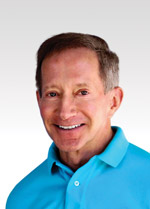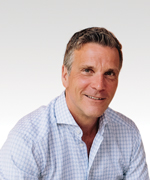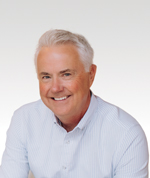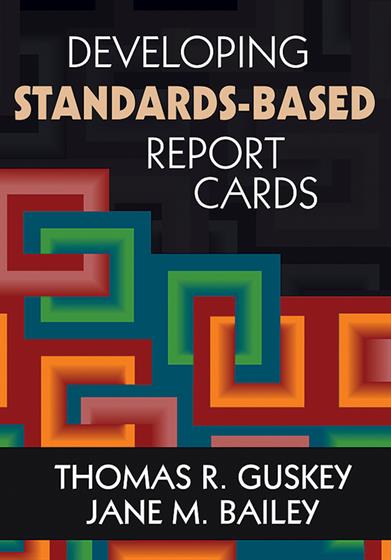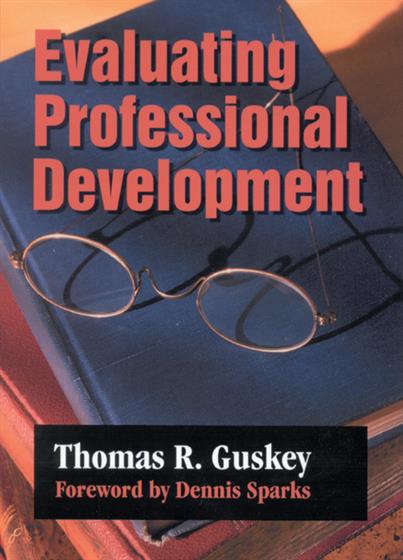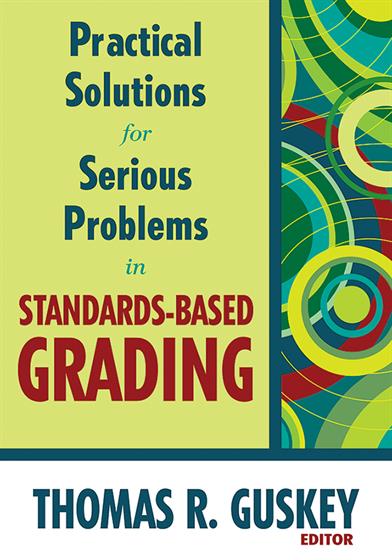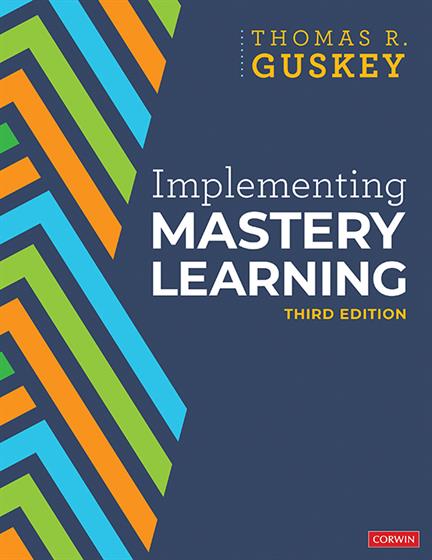Series 5 Leaders Coaching Leaders Podcast
[00:00:00.84] ANNOUNCER: Welcome to Corwin's Leaders Coaching Leaders
podcast with host Peter DeWitt. This podcast is from education leaders for
education leaders. Every week Peter and our guests get together to share ideas,
put research into practice, and ensure every student is learning, not by
chance, but by design.
[00:00:18.78] TANYA GHANS: Hi, Peter.
[00:00:20.85] PETER DEWITT: How are you?
[00:00:21.79] TANYA GHANS: I'm good. I'm good. I'm always happy when we're
doing another episode together because I know I'm going to be smarter at the
end of it.
[00:00:29.40] PETER DEWITT: I feel the same way. And, you know, it's funny
because I don't walk into these with a set of questions. I actually just walk
in as a listener and a learner. And I was very excited about today's because
it's Tom Guskey. And everybody knows Tom. Everybody knows who Tom Guskey is.
But his role is Professor Emeritus in the College of Education at the
University of Kentucky, but he's just written numerous books on self-efficacy,
on assessment. He's been all over the self-efficacy research and assessment
research for decades.
[00:01:07.54] He is, in fact, one of my gurus. And I know I kind of gush. So
I'm just giving people a warning because I do gush a little bit when I'm with
Tom because he is probably one of the top three people who have had the most
influence on me in education. And it's just because of the conversations, but
he's written guest blogs for me for Education Week. He's written hundreds of
articles for both research journals but also ASCD's Educational Leadership,
everything.
[00:01:37.56] And so I was very excited to talk to him because Tom never
disappoints.
[00:01:41.25] TANYA GHANS: Yeah, no. And he did not disappoint today. This
was-- as an educator, doing it for so long, there's so many terms that I feel
like I know or that I've been swimming in. But today's was like a class and
just going back to the roots of terms, like formative and summative and what
they actually mean. And so listeners are going to get this real like historical
take on terms they might be hearing, but the roots of where they came from in
this really-- again, our show is only 20 or so minutes long, so it won't be
belabored. But it's going to be really, really interesting.
[00:02:19.98] And I think a couple of other things that are going to happen
for listeners in this episode is that they are going to come away with some new
understandings, particularly in how teacher change happens. Or even what's the
most believable evidence? I have come away from listening to this I think with,
yeah, really some new insights that make me want to probe further into this
whole concept of mastery learning. It was a really fascinating conversation.
[00:02:52.95] PETER DEWITT: Yeah, Tom, is both masterful when it comes to
research, but also he can make it very practical. But in the middle is this
thoughtfulness. And I think when people are listening to this, there are a
couple of things to keep in mind.
[00:03:08.26] Number one, what do you know about mastery learning? What do
you know about self-efficacy? Because you're going to learn things about it
today, just in this very short 30-minute conversation. But it's also about how
do we-- you know, we had a good discussion about evidence, which is something
he and I have talked about a lot before. And we all value different evidence.
[00:03:31.56] So what do you do about that? And that's where Tom was-- I
appreciated Tom's insight where that's concerned. So, Yeah, just not surprised
at all at. Tom's just brilliant. So--
[00:03:45.92] TANYA GHANS: So listeners, yes, enjoy. This is going to be a
great listen. And look forward to hopefully hearing your feedback about how you
felt about it. But this was a great episode. So, Peter, as always, I will see
you on the other side.
[00:04:00.03] [MUSIC PLAYING]
[00:04:02.32] PETER DEWITT: Tom Guskey, welcome to the Leader Coaching
Leaders podcast.
[00:04:05.83] THOMAS GUSKEY: Well, Peter, it's such an honor to be with you.
Thank you for inviting me.
[00:04:09.35] PETER DEWITT: It's just always good to see you. I mean I feel
very fortunate every time our paths cross. Not only are you just this amazing
researcher and writer and I want to get into it all if we could even do that
within 30 minutes. But you were my first guest on "A Seat at the
Table" for Education Week. You write these amazing guest blogs for me for
Finding Common Ground that are so interesting as well.
[00:04:35.65] And I just feel really fortunate to know. When I talk to
people, I always say that you are one of the best gurus that I have in my life.
And I always feel very fortunate. So I did want to start off by saying that.
[00:04:49.10] THOMAS GUSKEY: Well, thank you, Peter. And I have to tell you,
I feel the same. I can't tell you how many times I go to places and people ask
me, I think Peter DeWitt, isn't it great?
[00:04:58.86] PETER DEWITT: Oh. Well, that's nice. So one of the reasons why
I wanted to be able to talk to you today is around the idea that you have the
third edition of Implementing Mastery Learning that you published with Corwin.
And I wanted to be able to talk about that because I think there are so many
great implications not just for teachers and students in a K-12 setting, but
also from, honestly, what I'm reading from a facilitator standpoint of
professional learning with adults, there are just so many important points that
you make in there that I think are valuable. So I don't want people to think
that although mastery learning really important for K-12 space, I think it's
also important to be modeled at the facilitator space when you're running
professional learning.
[00:05:52.12] THOMAS GUSKEY: Yeah, that's certainly true. And I think that
so many of our modern programs today really can trace the roots to mastery
learning. But oftentimes because the years have passed, the interpretation of
that gets blurred from time to time. So hopefully with this addition what we'll
be able to do is take people back and help them understand the original
thinking, the theory that was behind this, the early research that looked into
this, and really what contributed to its contribution to education and the idea
that it is such a powerful foundation for so many other educational programs
and instructional strategies.
[00:06:28.46] PETER DEWITT: So let's start there. One of the things that I
like to be able to do on the podcast is start with not only the common
language, but a common understanding. And honestly, you are one of the
influencers in why I do that because you and I have had so many conversations
about how things start. I remember talking to you about, so tell me more about
how the research behind self-efficacy started. So when it comes to mastery
learning, when we're looking at sort of the common understanding of what that
means, what is mastery learning?
[00:07:02.15] THOMAS GUSKEY: OK. Mastery learning was actually developed by
Benjamin Bloom in the late 1960s. He wrote about this initially in 1968. And it
was Bloom who brought to education the idea that assessments can be a part of
the instructural process. Prior to this hallmark work of Bloom, we always had
this idea that assessments occurred at the end of instruction. They were
primarily evaluation devices to determine who had learned well and who had not.
Grades were recorded. They were summarized in some later time.
[00:07:41.54] And Bloom came along in 1968 and described a process whereby
assessments could actually be a learning tool and a part of the instructional
process. His idea was that these should be devices that inform students about
how well they're doing and inform teachers about how effective their
instruction was. It was Benjamin Bloom in 1968 who brought the word formative
assessment to education. He actually borrowed the term from Michael Scriven,
who the year before in 1967-- Michael Scriven was writing about program
evaluation.
[00:08:19.79] And he described that in program evaluation what happens is
people commit at the end to just try to find out if anything has worked or not.
But Scriven was recommending to program evaluators is that they actually gather
information while the program is being implemented in order to provide this
sort of feedback to program developers so they can make changes as the program
is being implemented to be more successful when it got to the end.
[00:08:44.72] Benjamin Bloom and Michael Scriven were quite good friends.
And the very next year after they had had some discussions on this, Bloom
described how this could be carried over then into education. And we could use
assessments actually as formative devices. In 1971, he published the very first
book, handbook, On Formative and Summative Evaluation of Student Learning. So
it was this idea that assessments could be learning tools that provided the
basis for mastery learning.
[00:09:14.60] But Bloom also recognized that assessments alone really don't
improve instruction. It's kind of like checking your blood pressure regularly
or weighing yourself regularly doesn't improve your health. It's what you do
with the results. So Bloom emphasized that these assessments had to be followed
by what he called correctives, that the assessments provided this feedback to
students, but we had to pair with this feedback guidance and direction as to
how students could improve their learning.
[00:09:42.05] And Bloom emphasized, however, that this idea of correctives
cannot be reteaching, that going back and repeating a process that we already
know hasn't worked is unlikely to yield any better results the second time
around. So Bloom re-emphasized that these correctives needed to approach
instruction differently, that it had to involve a different presentation and
different kind of engagement for students. And he felt that in this way we
could really focus on student's individual learning difficulties to help those
be remedied.
[00:10:13.91] Then Bloom suggested following that with a second assessment,
a second formative assessment. And he recommended this for two reasons. First,
we did want to find out if these correctives have really been successful or not
at helping students remedy their learning errors. But more importantly, it
served as a motivational device, an opportunity, a second opportunity, for
students to really be successful and then gain the many valuable benefits of
that success. So he outlined this process of formative assessments, providing
feedback, paired with correctives, and a second formative assessment as a way
to help remedy the problems.
[00:10:52.31] But quite amazingly, he also recognized that for some students
the initial instruction is highly appropriate. And they have no need for these
corrective activities. But we also don't want them just sitting around biding
their time while everybody else catches up. For those students, Bloom
recommended we have to provide an exciting and challenging learning opportunity
to give them a chance to extend their learning, what he called enrichment.
[00:11:15.80] And so he outlined this process of this formative assessments,
enrichment for those students who do well. This should be rewarding and
challenging. Enrichment can't just be more harder problems. They have to be
some exciting thing that students who want to engage in. He recommended that
students can give them choice with regard to what enrichment activities they
employ.
[00:11:38.03] Outlined this in 1968, further developed it in the early
1970s. And that was how mastery learning was born.
[00:11:45.44] PETER DEWITT: And I love that you actually focus on that
within the book too because I think it's really important for people to
understand. So often these days, especially with social media, I feel like
sometimes people don't give credit to people who came before for them. And I
think we always have to acknowledge that we stand on the shoulders of giants.
And you do such a great job of that within the book.
[00:12:09.64] One of the things that I started thinking when I was reading
that, and just with all the work that you do, is there seems to be a gap
between what research says and the practice that's happening in the classroom.
And do you think that mastery learning has kind of suffered that same fate over
the years? And is that part of the reason why you wanted to write this third
edition to be able to kind of keep people grounded in what mastery learning
really is?
[00:12:38.77] I know that's a lot of questions that I just threw at you. But
I just feel like I feel like mastery learning-- and you touched on this right
at the beginning of the book-- mastery learning has really suffered this fate
of it's becoming a little bit more muddy with how people think mastery learning
is supposed to work. Is that true?
[00:12:58.03] THOMAS GUSKEY: Yeah, that's very accurate, Peter, actually. In
fact, in the first edition of Mastery Learning, Benjamin Bloom was still alive.
And he graciously accepted my invitation to write a foreword to the book. So in
the very first edition the foreword was written by Benjamin Bloom. And it was
an opportunity for him to reflect on how these ideas had sort of evolved over
that time.
[00:13:23.77] Like I said Benjamin Bloom developed this first in 1968. He
then many years later served as my advisor during my graduate studies at the
University of Chicago. But it was quite some time later.
[00:13:35.92] When we were developing this third edition, we thought that
the forward that he wrote that long ago was not particularly important. So what
we wanted to do was provide a perspective of what was happening. So the folks
there at Corwin asked if I could prepare a prologue for the book.
[00:13:54.43] In doing that, I tried to imagine what it was like in 1968
when Benjamin Bloom was writing these ideas and how he came up with it and
wanted to understand the social context in which it was developed. Well, back
in 1968, this was just two years after the Coleman Report, "Equality of
Educational Opportunity," had been written, which basically said educators
don't have a lot of influence. That whether kids learn or not in school, a lot
depends on their home environment and social, economic, and demographic
characteristics, and educators didn't really influence it based on the
information Coleman had gathered at that time.
[00:14:35.89] Our nation was in turmoil. It was the midst of the Vietnam
War. The Civil Rights Act had been passed. And we were working with
desegregation, but there were riots on the streets and all these different
civil rights demonstrations going on. It was a really troubled time.
[00:14:55.12] And along comes Benjamin Bloom and says, look, we are never
going to accomplish anything if we talk only about equality, that people come
to schools with very different kinds of backgrounds and skills. And so giving
them the same opportunity isn't going to remedy the problems. We have to think
about equity. We have to think about what we can do to help all students learn
well.
[00:15:19.48] And Bloom started with this premise that in any subject area,
any academic discipline, what you can learn is infinite. There's no limit to
what you can learn in any academic subject. But a curriculum is finite.
[00:15:35.95] And when we define a curriculum, we specify within an entire
domain of learning the things that we believe are most important for students
to learn. And as soon as we define that finite curriculum, our job as educators
becomes having all students learn that excellently-- not just some, not just
the brightest. I mean why would we ever define something in a curriculum that
we would expect some students not to learn well. It just doesn't make sense.
And so our job is really to have all students learn that excellently.
[00:16:06.31] But Bloom also recognized that to accomplish that we had to
deal with the constraints under which teachers work today. And that was that
most teachers taught in an environment where as one teacher with 20, 25 or more
kids at a time, fairly fixed curriculum they were expected to teach in a
limited amount of time in which to teach it. So what can we do within that
group-based instructional environment and adapt that to really enhance the
learning of all students given the diversity of learning skills and aptitudes and
backgrounds they brought to the classroom? Giving teachers a better way to
individualize and diversify their instruction, differentiate their instruction
within the constraints of a classroom.
[00:16:51.90] PETER DEWITT: I think in some ways-- well, obviously, in many
ways that hasn't changed, right? But there are a couple of different of
directions I wanted to be able to go. Earlier in the conversation, you were
talking about the idea that formative assessment is really about understanding
our instruction. It's not just understanding whether the kids learned it or
not.
[00:17:12.67] And one of the sort of surprising conversations I've had with
school leaders from time to time in just over the past year is that their
teachers are involved in formative assessments, but they don't see it as
feedback about their own teaching, which is really interesting to me. And why
do you think that's so hard? Like it seems like it would be common sense that
we're doing formative assessment. Here's what we know about how the kids
learned it or whether they learned it. How do we, as adults, not see that as
feedback within our instruction? Why is that so complicated?
[00:17:53.49] THOMAS GUSKEY: Well, I think a lot of it has to do with just a
basic frustration that teachers experience. I mean I work at a university where
we prepare a lot of new teachers. And teachers come out of our program very
enthusiastic, committed to the idea that they are going to be highly effective
and will be able to help every student learn excellently.
[00:18:14.43] But then they go into the classroom situation. And they see
these dilemmas. They try really hard. They try other options. They try
different approaches. And they're just not getting the results they want.
[00:18:26.89] And so this comes to a sense of real frustration on their
part. And in order to endure that, they have to start explaining that in some
way. And one of the explanations is that this is beyond my control.
[00:18:42.09] And we talk about this in terms of a sense of efficacy, as you
know, to believe that what you do can really make a difference. Or is the
things that students bring to the school the primary influence is whether
they're going to learn or not. When we find ourselves to be less effective than
what we had hoped, then we lose that sense of efficacy and start explaining
results in terms of these external factors.
[00:19:07.30] But one of the nice things that we've seen and studies that
I've conducted show, the studies that I've conducted actually have looked at teachers
and teacher change and what prompts teachers to change and what prohibits them
from change, what kinds of changes they make. And one of the things we've
always been interested in is this sense of efficacy. What is it that we can
really do to help teachers enhance their sense of efficacy?
[00:19:32.70] All these efforts that have tried to convince teachers they
can be more influential and affect their attitudes and dispositions directly or
their beliefs directly have had modest results at best. But one of the greatest
impacts we've seen of the implementation of mastery learning is that when
teachers see that these strategies work, when they see that what they're doing
does make a difference, they become much more efficacious.
[00:19:59.19] They start thinking, wow, I did this, and it's really having
an impact on kids. And then they start thinking, maybe there are more things I
can do, more things I can change to really have an even stronger impact. And so
when we show teachers that by using strategies that can work and do impact the
learning of their children in their classrooms, then they start thinking, this
is really important and I do influence this. So it restores that sense of
purpose and that sense of agency or efficacy, or whatever we want to call it
today, that says I control the conditions that can help my students succeed,
and I'm going to take advantage of those the best I can.
[00:20:42.27] PETER DEWITT: So I mention your name a lot. And I know I said
that at the beginning because I really have been deeply impacted by your
research. And one of the things that I had been using lately, and Jennie
Donahue, who you know very well, she has as well, is when we talk about just
what you're focusing on, which is what comes first, professional learning,
change in teachers' beliefs? And everybody seems to think it's a change in
teachers' beliefs.
[00:21:08.31] But you actually-- and correct me if I'm wrong-- really found
that professional learning-- and this is why it's impacted me because I
understand the onus is on me to make sure that when we're together, I'm very,
very intentional and we engage in metacognitive activities and everything we
can to make sure people get it. But professional learning, it starts with
professional learning. And then it goes to a change in teacher practice and
then a change in student practice or behavior. And then it will change teacher
beliefs. Is that correct?
[00:21:42.67] THOMAS GUSKEY: That is correct. Yeah, this is actually stems
back to-- my doctoral dissertation was on the process of teacher change. And
everybody agrees that there are these three major outcomes that we hope from
professional learning experience for educators. We'd like to get some change in
attitudes and beliefs. Want them to believe all kids can learn or believe
inclusion is a good thing, or change your attitudes about working with kids who
might have special needs and different things.
[00:22:10.50] We also like to get some changes in their practices, do things
a little bit differently as they teach. And finally, we'd like to have some
impact on student learning, broadly defined to include not only academic
achievement indices, but things like a sense of personal efficacy or agency,
confidence in learning such situations, believing that you can be successful in
these different learning environments.
[00:22:36.54] So I was able to trace in early work this long history that we
have in education, where we had the idea that the order of change was attitudes
and beliefs first, leading to change in practice, result in change in student
learning. And I was able to trace this back to the work of some early change
theorists who wrote in the 1930s and 1940s, Kurt Lewin, for example, who based
many of his ideas on psychotherapeutic models.
[00:23:01.61] But all of our evidence on teacher change was showing that that
wasn't the way it happened. That the real order of change was exactly as you
described. It was practices first, student learning second, and attitudes and
beliefs last. The reason that was so it is experience that shapes the attitudes
of beliefs. It's not the other way around. And so what we have to do is we have
to make sure that we provide strategies that can lead to that kind of feedback
to teachers so what they're doing does make a difference. We have to alter the
experience.
[00:23:37.31] We're finding the same holds true for students. All these
programs designed to enhance students self-efficacy or their sense of
well-being or a sense of growth mindset on the part of kids has had modest
results at best. Because to convince them they can be successful, but then have
them turn around in a classroom and fail, that doesn't matter. What we need to
do is show them that they can succeed in learning environments. Show them they
can experience success. And that experience then leads to their confidence that
they're going to be able to do it.
[00:24:12.37] PETER DEWITT: Yeah, and I think that, to me, has been so
powerful. Because when you think about it from a professional learning lens,
too often-- and when I'm referring to professional learning, whether we're
talking about meetings at the district office or professional learning within
the district or even when you're coming to a workshop or something like that,
I've been amazed at how many people that are told to go to a workshop that
don't even know why they're there.
[00:24:40.67] And it's happened through conversations, like just introducing
myself and asking people, so tell me, why are you here? And they don't know.
And they're being very open and honest. They're not being flippant about it.
[00:24:52.95] And that's where I think your work is really also very
important to show that professional learning doesn't just start when they show
up to the workshop. It's about-- like I'll develop success criteria, send it
out to the participants ahead of time, and then ask them to come with some
success criteria is modeling, how do you want to be successful?
[00:25:15.87] One of the other areas that-- and you know this because I've
talked to you about it numerous times-- you've had a profound impact on some of
the things that I say is still to this day we will talk to leaders who will say
this is the evidence that teachers have to use. And it might be standardized
assessments. Or they're not giving teachers much voice in what they're using
during PLCs, or whatever.
[00:25:43.15] And one of the things that I talk about and I reference you
all the time is, I remember a long time ago, I said, how do you raise
somebody's self-efficacy? Something you were just talking about. And you said,
it's not that easy. Like I hate to look at the effect size that you might see
and think, boom, you can just raise somebody's self-efficacy. You said there
are three things in place-- a protocol in place, evidence teachers trust, and
the strategy needs to make a difference within weeks, and not months.
[00:26:12.84] THOMAS GUSKEY: Yes.
[00:26:13.29] PETER DEWITT: And that evidence piece is always so important
because I don't always get the feeling that teachers are allowed or encouraged
to kind of choose their own evidence. There's not a great dialogue about that.
And I think that also goes back to what you were talking about earlier with the
whole idea of the profession and just the teacher voice part of it.
[00:26:36.36] I'm not saying that everybody should have full autonomy. But I
think we should have a discussion about what evidence is going to work best for
us for the success criteria that we have set. Is that correct thinking?
[00:26:50.76] THOMAS GUSKEY: You're absolutely correct, Peter. And I know
this is-- this actually stemmed from a study that I did some years ago where I
took 15 different indicators of student learning. And these ranged from things
like scores of nationally standardized tests, state assessments, end of year
tests, classroom assessments, homework completion, quizzes, all these different
sorts of things. I had 15 of them.
[00:27:17.19] And I gave them to groups of educators. And I said, now, we
could argue that any of these could be acceptable or valid indications of
student learning. How would you rank these in terms of their importance, of
what you think is the most trustworthy evidence to show that students have
learned well? And I did ask them to rank order them so that they can compare
each one with the other.
[00:27:37.54] And after they did that, I compared to rank ordering of
teachers and school administrators, school leaders. They were almost exactly
reversed, almost exactly reversed. The school leaders said, whoa, it's those
large-scale assessments. That's the state assessments. That's what our school
is judged on. That's what the board cares about. That's what I get called on
the carpet on.
[00:27:59.76] Teachers said, not all that important. We do it once a year.
We don't get the results back for two or three months. By that time, my kids
were off with another teacher. I trust my own evidence. I trust the evidence
that I see. That's the evidence that I can use to let me know how my kids are
doing.
[00:28:17.01] Well, so what does that then say if you're leading a
professional learning experience? What it says is you have different
stakeholders in this process who trust and believe different evidence. And so
you can't trust a single source. Because you have multiple stakeholders, you
need to think about multiple sources of evidence.
[00:28:34.64] I always tell the tale when I'm asked to defend any
professional learning experience to a board of education, I always use
testimonials. I mean I parade teachers in front of them who say, you know, I
was so distraught, and I was getting ready to take early retirement. I got in
this program. I'm a better teacher now than I ever was. I can't wait to get to
school in the morning. I'm so excited about being a part of this profession.
[00:28:58.44] I parade kids in front of them who will say, I hated school. I
was getting ready to drop out. Missing school all the time. And now, I look
forward to coming to school. I do two hours of homework every night. The letter
from Harvard arrived yesterday. All right? Now, from a research perspective,
testimonials are a very poor source of evidence.
[00:29:17.43] PETER DEWITT: Right.
[00:29:17.94] THOMAS GUSKEY: They're very limited. They're based on highly
biased perspectives. The reason I use them? It's the evidence that board
members believe. I can put charts and graphs in front of them. But to have a
teacher or a kid say to them this made a difference in my life, that makes a
difference for them. And so what I encourage people who are engaged in
professional learning to do is to think about the stakeholders in a process and
what evidence they trust.
[00:29:45.52] But to get back to your other point too, when you come back to
teachers, it can't be evidence that they're going to wait a year to find out
about. They're not going to wait till the end of the year. It's kind of like if
you start a new exercise program or a diet, you're not going to wait for three
months to find any effects.
[00:30:03.52] PETER DEWITT: Yeah, exactly.
[00:30:04.81] THOMAS GUSKEY: It has to make some difference pretty quickly.
And the same is true for teachers. And the thing is it's not because teachers
are afraid of change. It's because teachers are so committed to the learning of
their kids.
[00:30:16.45] And there is this danger that they sense that if they persist
with these activities because it's different from what they've done before,
their kids might learn less well. And teachers are reluctant to sacrifice their
students for the sake of innovation. If they don't see it working better,
they're going to revert back to tried and true things they've always done. So
that's why we need to build in this mechanism whereby teachers can get that
feedback pretty quickly.
[00:30:40.55] PETER DEWITT: Yeah, I remember in Bandura's research talking
about with leader self-efficacy was they're going to double their efforts. But
if they don't feel confident, they're going to slacken their efforts. And
failure can really determine what's going to happen in that situation.
[00:30:59.14] I want to get back to when you're talking about teachers and
students. And one of the things that I thought was powerful about Mastery
Learning, because it really is-- it's everything. You've got the history of
where it started. You've got the progression where people have kind of taken it
maybe in different directions than you would have taken it. But also you give
clear insight on what mastery learning looks like.
[00:31:27.53] So I guess one of my last questions for you is, you travel
around the world. You work with lots of schools and organizations. Where have
you seen mastery learning done well? And what does that look like in a
classroom environment?
[00:31:44.41] THOMAS GUSKEY: Yeah, well, I always stress that we need to
consider where Bloom drew his ideas from in developing mastery learning. And he
really drew those ideas from two different sources. The first was a group of
studies on tutoring because he thought of all instructional conditions that has
to be best. I mean think of it. If we could provide for every student an
excellent tutor who could work one on one with them the entire school day, what
wonderful results we might get.
[00:32:12.43] Or consider if we could reduce class size to one. But what is
it happens in that one tutor, one student interaction that really makes it so
effective? And are there aspects of that we could carry over to group-based
instruction?
[00:32:27.37] And then very sort of thoughtfully, but cleverly, Bloom looked
at another set of studies that had analyzed the strategies of successful
students in group-based classrooms. So what do successful kids do that less
successful kids don't do?
[00:32:42.85] And it was from those two sources of evidence that Bloom drew
is ideas for the mastery learning. If you think about mastery learning, it's
exactly what teachers do when they tutor an individual student. If they're
tutoring a student and the student makes a mistake, the teacher doesn't go on.
[00:33:00.43] The teacher stops, points out the mistake to the student.
That's feedback. Tries to re-explain that idea or concept in a different way.
That's corrective. Then asks another question or pose another problem to ensure
the student understands it before going on. And all Bloom is trying to do is
give us a way that we can carry over that same highly effective take to a
group-based instructional environment.
[00:33:25.51] And plus, it's exactly what the very best kids have always
done for themselves. I mean if you think about that, what do the very best
students in any class do when the teacher hands back an assessment? Well,
number one, they always save it. They go over it and look at what they got right
and what they get wrong.
[00:33:43.12] For those things that go wrong, they rework those problems.
They look up the answers. They ask the teacher about it so they don't make
those same mistakes again.
[00:33:50.59] But how different it is from the poor students. What do they
do with that assessment? Well, it's in a trash can as they're going out the
door, if they wait until then.
[00:33:59.92] So the very best students have always used assessments as a
way to gain feedback on their learning and to correct the learning problems.
Bloom's idea was, can we help teachers structure learning environments in such
a way that they can compel all of their students to do exactly what their very
best ones always did for themselves?
[00:34:17.81] And so I think that in those early efforts to implement
mastery learning, those were the things that were really emphasized, taking
those two sources of evidence and applying it to group-based instruction,
seeing what elements we could transfer that environment to lead to the very
positive results we had. But it's like you said, sometimes we get away from
things. And we talk about them and fail to go back and give credit to the
really brilliant people that developed these ideas in the first place.
[00:34:46.84] PETER DEWITT: And we try to add to them, which can sometimes
be a distraction. I think the onus is on us to make sure that we're not doing
that either. You have such a great way of making the complicated less
complicated, which is what I love about you, whether you're writing a blog or a
book. I mean all of your books are brilliant. I love your articles.
[00:35:07.75] And I feel like I'm gushing right now, but you know this
anyway. They're always powerful. And they're always very practical. And yet
they're so based in research.
[00:35:19.39] And Implementing Mastery Learning, the third edition, I read a
lot of books. And it is a book that as soon-- and I knew this-- but as soon as
I opened it up, I just started highlighting. And I started, oh, I could use
this. Oh, this is something that would be beneficial. So congratulations on yet
another book.
[00:35:40.87] But, Tom Guskey, I know we covered a lot of ground. But thank
you for what you do for education in general. But I just really appreciate the
influence you've had in my life too. And thanks for being a part of the Leaders
Coaching Leaders podcast.
[00:35:57.61] THOMAS GUSKEY: Well, thank you, Peter. And again, the same is
true for you. Our conversations have always helped me see ideas more clearly.
You always point out perspectives to me that I hadn't thought about that
clarify my own thinking and my ideas on this. And I really appreciate all the
guidance you've given me over the years of our friendship. Thank you.
[00:36:14.56] PETER DEWITT: Well, I think you're being very kind. But I'll
take it.
[00:36:17.59] THOMAS GUSKEY: Of course.
[00:36:18.37] [MUSIC PLAYING]
[00:36:22.66] TANYA GHANS: Peter, that was an absolutely fantastic
conversation. I feel like I learned so much. I felt like I was in a classroom,
but in one of the great classrooms where you're learning from the greats. And
you really the bell rings or whatever it is that tells you time is up and
you're like, no, I want a little more. It was really good.
[00:36:41.84] I mean, he has given me so much food for thought in a short
period of time. For example, you know, he speaks about-- there's this whole
chicken and egg thing about whether it's do teachers' beliefs have to change
first or is it the professional learning that they get first? And I'm sure
people can argue for both sides of it. But it really resonated with me where he
was like people have to have experiences that are positive to impact and affect
their belief system around things.
[00:37:14.50] If you just start by asking people to change their beliefs but
don't give, in this specific context, teachers exposure to those wins or
successes, those beliefs really don't have anything to hold on to and change.
So I think, after this short time, I'm a believer in, yeah, it's giving
teachers and anyone the strategies or their skills to do something well, see
that change happen, and how that fuels-- just the belief change and how it
feels a change in your understanding of your own efficacy. You have to have
something tangibly good happen first before that is spurred. So that is
probably my biggest takeaway from this conversation.
[00:37:58.51] PETER DEWITT: Yeah, Tom-- I know this is going to sound
strange, but Tom makes educational research very exciting.
[00:38:04.33] TANYA GHANS: Yeah.
[00:38:05.47] PETER DEWITT: He really does. He makes me always want to go
and read more and go deeper and those kind of things. And I enjoyed the
conversation because of the professional learning side of it, like people need
to understand as facilitators-- whether we're talking about directors of
teaching and learning within a school district or consultants who are running
professional learning-- that that professional learning you are facilitating is
really, really important. And Tom explains why.
[00:38:38.95] But it's also about leadership. Because when we're school
leaders-- and he said it. He had a study. And leaders value different evidence
than teachers do. And he talked about how the list of 15 that were completely
the opposite. And that should engage us in a conversation about what are
multiple-- and we're talking two, three-- pieces of evidence where people get
what they want and need. Whether it's a leader, if a leader values some sort of
standardized assessment, that's fine. But if a teacher values a different
assessment are their voices being heard?
[00:39:23.92] And it's one thing we didn't get into. But all of what Tom
talks about within this 30-minute block but also, honestly, in ways in his
articles and books, we have a teacher attrition issue. We've got a teacher
shortage, whatever we want to call it. We know that people are leaving the
profession. And sometimes they're leaving the profession because they don't
feel heard or they're not getting what they need.
[00:39:51.94] And Tom has a lot of different research and advice and insight
into how to change that dynamic. So when people are looking for how do we get
people to stay in the profession, quite honestly, and I'm not being overly
dramatic, I find a lot of what Tom talks about and researched and writes about
is exactly what we need to do to not just keep teachers in the profession, but
also elevate the profession and have more of an impact on student learning.
[00:40:22.13] So I feel very fortunate just to have these podcast interviews
because I feel like all of them, all of the ones on the season this year are
really, really important. And they've been heavily engaging for me. But they're
all different too. They all have their own nuances.
[00:40:41.32] TANYA GHANS: Yeah.
[00:40:41.67] PETER DEWITT: So very excited to talk to Tom today.
[00:40:44.02] TANYA GHANS: Yeah, it was just fantastic. And teachers
absolutely need to be heard and also need to see success, right, the
combination. And there's other factors. But we definitely hit on some of those
pieces today.
[00:40:57.58] I've learned a lot. I was absolutely, like all conversations,
a learner in this one. But lots of food for thought. I'm going to be picking up
his latest addition of Mastery Learning. Right, it's the third edition.
[00:41:10.27] PETER DEWITT: Implementing Mastery Learning, Third Edition.
And it's just very research-based. But it's also extremely practical for what
this could look like in the classroom and in our school, and also if you
facilitate professional learning. I mean I find value in it just from that
space.
[00:41:29.89] But, yeah, if people like what they heard-- and I don't know
how you couldn't like what you heard today-- but I'll just say, if you like
what you heard today, give us some feedback and let us know-- follow the show--
and let us know what you think because we really do want to hear from you.
[00:41:46.39] But, Tanya, always good to see you.
[00:41:49.31] TANYA GHANS: Thank you for another great session. It's always
great learning with you and cannot wait until next time. Listeners, stay tuned
because it just keeps getting better. Bye, everyone.
[00:42:02.62] PETER DEWITT: All right, bye, everyone.

